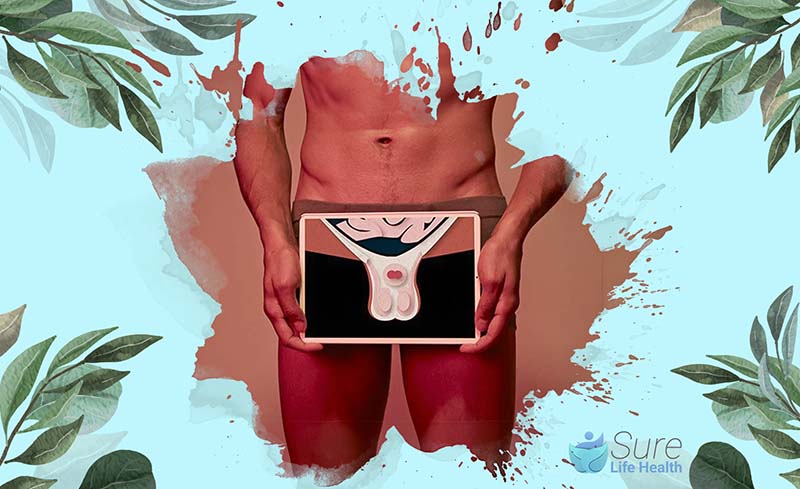Choosing underwear, whether briefs, boxers, or thongs, is a deeply personal decision. But when it comes to snug-fitting undies, there’s a question mark hanging over their impact on your health, specifically regarding ‘Does Tight Underwear Affect Erectile Dysfunction?’
Some studies suggest that wearing tight underwear might not be great for your health (we’ll get into that in a bit), but the answer isn’t crystal clear.
In this article, we’ll explore the potential downsides of tight underwear, focusing on the question ‘Does Tight Underwear Affect Erectile Dysfunction?’ and give guys the lowdown on what they need to know about their undergarment choices. Let’s get started.
Can Tight Underwear Affect Erectile Dysfunction?
Contrary to common belief, tight underwear isn’t directly responsible for causing erectile dysfunction (ED).
Although snug-fitting undies can be linked to infertility because they may raise testicular temperature, there’s no solid medical evidence to suggest that tight underwear causes ED. This misconception has been debunked by urologists and reputable health institutions.
The causes of ED are diverse and can involve a range of factors including physical, psychological, and lifestyle elements such as smoking, alcohol intake, and certain medications.

What Are the Negative Effects of Tight Underwear on Men?
Let’s delve into three key reasons why men should steer clear of snug-fitting underwear:
Creates a Feeling of Discomfort
Tight underwear can be uncomfortable to wear for long periods, leading to a decrease in overall well-being and confidence, aside from any physiological effects.
Causes Urinary Tract Problems
Pressure on the urinary tract from tight underwear can potentially lead to issues like urinary tract infections or frequent urination.
Reduced Blood Circulation
The tight elastic of snug underwear can impede blood circulation, affecting blood flow to the penis, testicles, and thighs.
This reduction in blood flow to the genital area can contribute to erectile dysfunction (ED) and other related problems.
Heat Accumulation
Tight underwear can create a “heat trap” around the genital area, causing temperatures to rise.
This elevated heat can adversely affect sperm quality and reproductive health by hindering proper sperm development.
Increased Chance of Skin Infections
Tight underwear traps moisture, fostering bacterial growth which can lead to various infections. The lack of airflow exacerbates dampness, leading to unpleasant odors
and potentially causing rashes, chafing, and cuts, particularly during physical activity or manscaping.
Causes Varicocele
Tight underwear may contribute to the development or worsening of varicoceles, swollen veins in the scrotum.
Varicoceles can impair sperm production and quality, further impacting male fertility.

How Do Tight Underwear Affect Sperm?
A recent study published in the journal Human Reproduction uncovered a connection between tight-fitting underwear and lowered sperm count. Male infertility, which contributes to approximately half of all cases where couples struggle to conceive, often stems from issues with sperm quality, including low sperm count, poor motility, or abnormal sperm shape.
For couples trying to conceive, sperm count is a crucial factor. Surprisingly, something as simple as changing underwear can significantly impact fertility. Ideally, the testicles should remain outside the body within the male reproductive system to maintain a lower temperature than the core body temperature. Heat can adversely affect sperm production, and consistently wearing briefs can lead to overheating of the testes. Therefore, the implications of tight underwear on sperm health are evident.

How to Choose Underwear So as Not to Affect Your Health?
To avoid the potential health risks associated with tight underwear, individuals can opt for healthier alternatives by considering the following tips:
Choose Airy Fabrics
Select underwear made from natural, breathable fabrics like cotton. These materials allow for better air circulation, reducing moisture buildup and promoting comfort
Choose The Right Size
It’s crucial to choose underwear that fits properly without being overly tight. Properly fitting underwear provides adequate support while ensuring comfort throughout the day.
Always Pay Attention to Daily Activities
Take into account your daily activities when selecting underwear. For activities that involve intense physical movement, opt for underwear that offers proper support without being excessively restrictive.
Keep Clean Regularly
Regardless of the type of underwear you choose, prioritize good hygiene practices. Regular cleaning helps prevent infections and skin irritation, ensuring overall health and comfort.
Underwear and Hygiene Tips
Here are some simple yet effective underwear and hygiene tips to enhance genital health and reduce the risk of certain conditions like UTIs and yeast infections:
- Choose Natural Fabrics: Opt for underwear made from natural fabrics like cotton, as they naturally absorb moisture, keeping you dry and comfortable.
- Size Up If in Doubt: If you find yourself between sizes in underwear, it’s wise to go for a size up. A proper fit is key to avoiding discomfort and promoting airflow.
- Change Daily: Make it a habit to change your underwear at least once a day to prevent the accumulation of bacteria and maintain freshness.
- Choose Appropriate Activewear: When working out, opt for moisture-wicking underwear with a bit of stretch. This helps prevent bacteria buildup and minimizes chafing during physical activity.
- Consider Boxers for Conception: For individuals trying to conceive, boxers may be a preferable choice as they help maintain a cooler temperature in the scrotum, which is conducive to sperm health.
- Avoid Certain Materials and Styles: Steer clear of lace, polyester, or overly tight shapewear, especially for prolonged periods, as they can trap moisture and promote bacterial growth.
- Consider Going Commando at Night: It’s safe and even beneficial to skip underwear at night, allowing your genitals to breathe. If going naked isn’t your preference, opt for loose-fitting bottoms for comfort.
- Use Hypoallergenic Detergent: Launder your undergarments with hypoallergenic detergent to minimize the risk of skin irritation or allergic reactions.
Conclusion
In conclusion, it’s essential to prioritize your genital health by making informed choices about your underwear.
While tight underwear may not directly cause erectile dysfunction, it can contribute to discomfort and other health issues. And remember, for more insightful blogs on men’s health topics like “Does tight underwear affect erectile dysfunction?”, be sure to explore Sure Life Health’s other articles. Your health matters, so keep seeking knowledge and making informed decisions.
Be sure to explore more insightful blogs from Sure Life Health, where we continue to shed light on the latest trends and breakthroughs in health and wellness.
Professor Gaye Cunnane, PhD, MB, FRCPI
As the Director of Health and Wellbeing at RCPI, Professor Gaye Cunnane is at the helm of initiatives aimed at enhancing the health and well-being of RCPI Trainers and Trainees. Her role extends beyond administration; she is also a respected clinical professor of rheumatology and a consultant rheumatologist at Trinity College Dublin (TCD) and St James’s Hospital. Prof. Cunnane’s medical journey began at TCD, where she graduated from medical school, and her path has been marked by both clinical and academic excellence.
After completing her basic clinical training in medicine, she embarked on PhD studies at University College Dublin and St Vincent’s University Hospital. Her research during this period was focused on prognostic markers in early inflammatory arthritis, a project that saw her collaborating with esteemed universities across Europe, including in Switzerland, The Netherlands, the UK, and Sweden.
Prof. Cunnane’s career took her to the University of California, San Francisco, where she spent three years delving into research on new treatments for lupus. Her academic prowess led her to the University of Leeds in 2001 as a senior lecturer, before returning to Ireland in 2003 to assume her current roles. She has also served as the National Specialty Director for Rheumatology training in Ireland, Programme Director for Basic Specialist Training with RCPI, and as a past President of the Irish Society for Rheumatology.
PUBLISHED ARTICLES
“Rheumatic disease differentiation using immunoglobulin G sugar printing by high-density electrophoresis”: Published in The Journal of Rheumatology, this study reflects her in-depth investigation into rheumatic diseases.
“Benefits of exercise in patients with rheumatoid arthritis: a randomized controlled trial”: This research work, highlighting the positive impact of exercise on rheumatoid arthritis, underscores Prof. Cunnane’s dedication to practical, patient-centered research.
Additionally, Prof. Cunnane has made notable contributions to the Annals of the Rheumatic Diseases, discussing early referral, diagnosis, and treatment of rheumatoid arthritis. She has also been involved in a study on the NCBI platform investigating exercise benefits in rheumatoid arthritis patients.
Professor Gaye Cunnane’s career is a testament to her commitment to improving patient outcomes in rheumatology through rigorous research, clinical excellence, and dedicated teaching. Her work continues to influence the field of rheumatology, both in Ireland and internationally.

